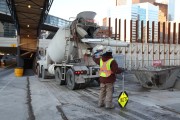I spent today in the B.C. budget lockup, and yes, it was as inspiring and exciting as I’m sure you can imagine a budget lockup would be. One of the things I was interested in was the outcome of the province’s carbon tax review, which was announced in last year’s budget.
What did the province hear from the public and stakeholders? What did it learn from its own analysis? What did it decide to do going forward? Here are my top four takeaways from today’s budget:
1. The carbon tax is working
We already knew from a handful of studies (see here, here and here) that the carbon tax is helping to reduce fossil fuel use in B.C. For example, the study from Sustainable Prosperity found that British Columbians’ use of petroleum fuels (subject to the tax) dropped by 15.1 per cent – and by 16.4 per cent compared to the rest of Canada since the tax took effect in 2008.
Through the review, we learned that the impacts on the economy have been negligible and that there is strong public support for the tax. Given that the framing of the review focused very much on concerns for business competiveness, it’s great to see that the province didn’t find them significant. Nor did it find any justification to introduce loopholes (with one exception, noted below) or to reduce the rate. That’s not to say the input was all positive. Businesses expressed concerns about competiveness, but the province decided these concerns weren’t significant enough to justify modifying the tax.
2. The government isn’t ready to move the policy forward
The big picture conclusion from the provincial carbon tax review is that it’s having the desired impact both economically and environmentally. Furthermore, of the 2,200 public submissions, more than 75 per cent expressed support for the tax and for taking next steps.
What’s a good next step? One is to increase the rate. Another is to broaden it to emissions not currently covered. Still another is to put a portion of new revenue toward climate solutions. Yet, even with this advice in hand, it was rejected. To add insult to injury, the province chose to increase other taxes instead. If the province is already prepared to increase taxes on British Columbians, why not choose to increase one that helps it meet its other objectives, i.e., to help slow climate change?
3. The exemptions for greenhouse growers are still problematic
Last year the province introduced an exemption for greenhouse growers. We were critical at the time because of the lack of evidence to support making the change, as well as the way in which it undermined the incentive to reduce greenhouse gas (GHG) pollution. This year the province announced an extension of that exemption, as well as a new exemption for the fuels used in tractors and other farm vehicles. In total, these exemptions amount to about $20 million out of the $1.2 billion the province received in carbon tax revenue last year. The justification given is that agriculture is important to the province and the carbon tax is putting them at an economic disadvantage.
Whether you agree or disagree with the rationale, there are much smarter ways to alleviate competiveness concerns. This approach, however, provides much less incentive for this sector to reduce GHG pollution; the carbon tax encourages industry to find ways to cut its pollution to pay less tax. Alternative approaches (that are mentioned in the carbon tax review) include rebates based on production, or indexed to 2012 emissions. These approaches would have accomplished a similar economic objective without undercutting the environmental ones.
4. Revenue projections suggest the province is prepared to miss its 2016 emissions reduction target
If the province is going to meet its climate targets without increasing the carbon tax rate it should be forecasting a decline in carbon tax revenue, but the opposite is true.
If we assume B.C. met its legislated 2012 targets (we won’t know until the data is available in 2014), the $1.2 billion the province received in carbon tax revenue last year would be based on emissions that are six per cent below 2007 levels. Meanwhile, the Ministry of Finance projects that revenue will creep up by nine per cent (to $1.3 billion) by 2015/2016, which means the GHGs covered by the carbon tax will also increase by nine per cent in the same time period.
B.C.’s target is 18 per cent below 2007 levels by 2016. If the province is planning to miss this target it should also be prepared to tell British Columbians that it’s about to break its own law.
These are my initial observations based on the carbon tax review presented in B.C.’s 2013 Budget. I’m hoping the province releases more information on the review in coming days, as well as any economic analysis it completed through the process. I’ll provide more comment if, and when, that information becomes available.





